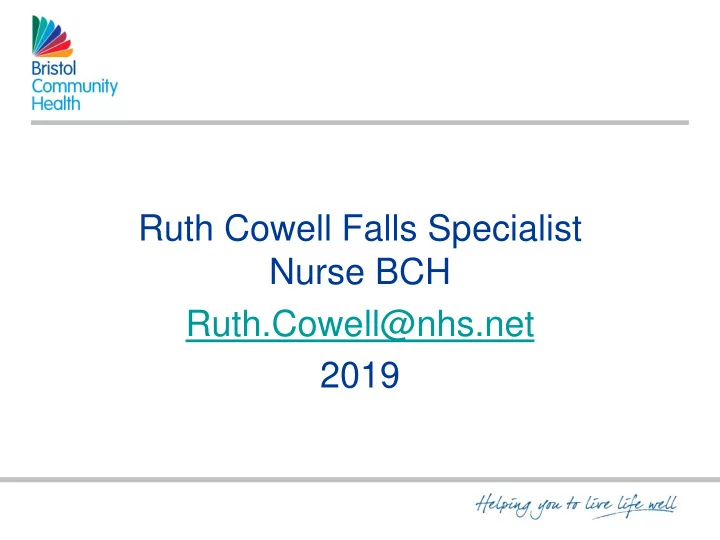

Ruth Cowell Falls Specialist Nurse BCH Ruth.Cowell@nhs.net 2019
NICE (2013) guideline Older person should be asked on contact if they have fallen in the last year and have a multifactorial falls risk assessment (MFRA) if • Presenting with single fall requiring medical attention • 2 or more falls in past year • difficulties with walking or balance
What is a fall? unintentionally coming to rest on the ground, floor or other lower level (NICE 2013) • a symptom or alert - may be first presentation of frailty or dementia Falls is one of the frailty syndromes
Multifactorial risk assessment = Holistic Assessment Shared decision • Detailed questioning about the fall/ making loss of balance • Consider all risk factors • Physical assessment of walking, transfers and functional tasks • Summarise cause of falls • Management plan and onward referrals
Sudden unexplained fall? • Needs medical assessment How would you know?
How would you know? • Sense of feeling faint or light-headed • “Legs went weak” “vision blurred” (Often sign of postural drop in BP) • Injury type • Unable to account for fall, found self on floor • Witness account • Pulse?
Clues to postural BP drop • Cerebral hypoperfusion – Light head – Visual distortion – Temporary cognitive defect • Muscle Hypoperfusion – Pain in coathanger region when upright but not flat • Other – Pass more urine at night – Always positional – Hyperventilation on standing
Types of dizziness • Presyncope • Vertigo • Dysequilibrium • Other cerebrovascular disease ( muzzy) cervical spondylosis ( various) Cla larify ify wha hat t pa pati tien ent t fe feel els
Dysequilibrium • Balance dysfunction • A sense of unsteadiness • “Thought I was going to fall” • “Dizziness in the legs”
Maintaining balance • Central processing • Proprioception • Hearing and vision – neck • Leg muscles – hips (especially – knees quadriceps) – ankles
Risk factors for falls • Intrinsic risk factors- e.g. balance, strength, morbidities, peripheral neuropathy, problem solving, risk taking, planning, reaction times, central processing, mental illness • Extrinsic risk factors- e.g. environment, shoes, alcohol, lighting, uneven surfaces, camber . • Precipitating causes- e.g. multitasking, rushing to get to toilet or answer phone, reaching too far, mobilising without an appropriate aid
Culprit medications https://www.rcplondon.ac.uk/guidelines- policy/fallsafe-resources-original • Drugs acting on the brain -includes sedatives, allergy, urinary dysfunction • Drugs acting on the heart and circulation • Drugs causing hypoglycaemia NB beware overtreatment of hypertension resulting in postural hypotension
Signposting • Advice (pendant alarm, optician, hearing aid, fluid intake, chiropodist). • Services for basic equipment (eg zimmer frame, stick, trolley, commode/bottle) • Care Direct or Care and Repair (steps, ramps, stair rail, grab rails). • Staying steady exercise groups
Further assessment • GP- includes bloods screen, BP , pulse • ENT for BPPV/ vestibular physiotherapy • Care of elderly clinic – medical assessment of – Patients with suspected syncope. – Patients with dizziness. – Patients with unexplained / recurrent falls. – Patients with falls requiring complex medication modifications • Admission prevention clinics • Falls clinic
Community services include • Community therapy, including intensive input • MSK and outpatient physiotherapy • Rapid response (acute management caused by being unwell or acute injury from a fall) • Council – eg OT, assistive technology and reablement • Specialist housing • Falls Specialist -referral or advice • Community nursing teams • Podiatry and chiropody • Bladder and bowel service • Optometrists – can be at home if housebound • Voluntary sector
Recommend
More recommend